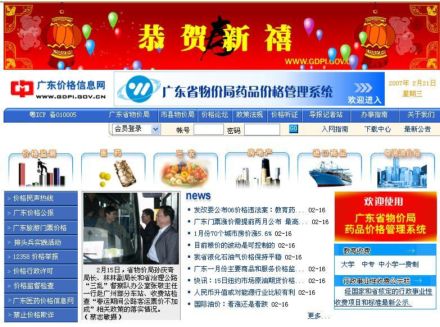Guangdong’s provincial office in charge of product pricing announced in a new statute on price supervision that the media have a “right to carry out press supervision” on the issue of fair pricing. [BELOW: Screenshot of Guangdong government site offering pricing information on goods and services].

The statute, “Guangdong Province Statute on Price Supervision (Draft Soliciting Comment)”, covers a wide range of goods and services and defines the legal responsibility of various points in the supply chain regarding fair pricing. It outlines maximum penalties of 50,000 yuan (US$6,500) for parties failing to provide information on pricing or cooperate with oversight procedures. The draft was made available on the Web starting February 14, and will seek public comment through April 1. [Chinese coverage at Sohu.com].
Officials in Guangdong said the goal of the statute was to better regulate and stabilize price levels to protect the “legal rights and interests of consumers and business operators, and the public interest”.
According to the statute, released by Guangdong’s Product Pricing Bureau (广东省物价局), “any company or individual has the right to inform or conduct supervision in cases harmful to the legal rights of consumers or business operators in regard to pricing (损害消费者、经营者合法价格权益的行为).”
Concerning the role of the media and release of information, the statute said: “The news media have the right to conduct supervision by public opinion [“watchdog journalism”] on pricing. All pricing departments at people’s governments at the county level and above must establish working information release systems for prices and pricing policies and take the initiative in notifying the public about major readjustments in pricing policy.”
Unfair pricing of goods and services in China has been a source of irritation for consumers in recent years, with continued media coverage of such stories as unreasonable road repair fees levied on motorists. The Guangdong statute directly tackles three areas in particular, mandating that prices must be lowered for toll roads, fixed-line television and telecoms services “when service quality goes down”.
In recent years a number of local or targeted measures to address various economic, social or environmental problems in China have included statements on the media’s role in conducting “supervision by public opinion”, or “watchdog journalism”. These regulations, which seem to empower media on circumscribed issues within certain jurisdictional scopes, have cropped up amidst a general worsening of the overall atmosphere for media in China. Many journalists say conducting watchdog journalism has become increasingly difficult since 2003.
Domestic debates on media freedom and the role of the media have also cropped up from time to time around these localized laws and regulations mentioning media supervision.
When Henan’s capital city of Zhengzhou singled media out as a key form of monitoring in local legislation to combat official corruption late last year, China’s official People’s Daily praised the move. On January 6, however, The Beijing News offered a moderate dissent in an editorial by a prominent legal scholar, saying the language “should” in the media-related portion was ill-chosen and that such legislation should emphasize the right rather than the duty of media to perform a watchdog role. The editorial advised Chinese leaders to take the lead in protecting the media’s right to conduct watchdog journalism, rather than surrender the issue to local governments.
Unlike the controversial Zhengzhou legislation, Guangdong’s fair pricing statute specifies that media have a “right” (有权) to carry out watchdog journalism.
[Posted by David Bandurski, February 21, 2007, 12:00pm]




















